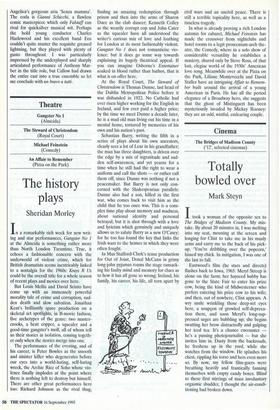Theatre
Gangster No 1 (Almeida)
The Steward of Christendom (Royal Court) Michael Feinstein (Comedy) An Affair to Remember (Pizza on the Park)
The history plays
Sheridan Morley
In a remarkably rich week for new writ- ing and star performances, Gangster No 1 at the Almeida is something rather more than North London Tarantino. True, it echoes a fashionable concern with the underworld of violent crime, which for British dramatists seems inextricably linked to a nostalgia for the 1960s: Krays R Us could be the overall title for a whole season of recent plays and movies over here.
But Louis Mellis and David Scinto have come up with an immensely powerful morality tale of crime and corruption, sud- den death and slow salvation. Jonathan Kent's brilliantly spare production on a skeletal set spotlights, in B-movie fashion, five archetypes of the genre: two master- crooks, a bent copper, a squealer and a good-time gangster's moll, all of whom tell us their stories in isolation, coming togeth- er only when the stories merge into one.
The performance of the evening, and of his career, is Peter Bowles as the smooth and sinister killer who degenerates before our eyes into a world-hating, self-hating wreck, the Archie Rice of Soho whose vio- lence finally implodes at the point where there is nothing left to destroy but himself. There are other great performances here too: Richard Johnson as the rival thug, finding an amazing redemption through prison and then into the arms of Sharon Duce as the club dancer; Kenneth Colley as the wearily corrupt cop and John Cater as the squealer have all understood the writer's curious mix of love and loathing for London at its most fashionably violent. Gangster No 1 does not romanticise vio- lence: but it does go some way towards explaining its hugely theatrical appeal. If you can imagine Osbome's Entertainer soaked in blood rather than bathos, that is what is on offer here.
At the Royal Court, The Steward of Christendom is Thomas Dunne, last head of the Dublin Metropolitan Police before it was disbanded in 1922. No Catholic had ever risen higher working for the English in Ireland, and few ever paid a higher price; by the time we meet Dunne a decade later, he is a mad old man living out his time in a mental home, tortured by memories of his own and his nation's past.
Sebastian Barry, writing the fifth in a series of plays about his own ancestors, clearly sees a lot of Lear in his grandfather; the man has three daughters, is driven over the edge by a mix of ingratitude and sud- den self-awareness, and yet yearns for a time when he still had the right to wear a uniform and call the shots — or rather call them off, since Dunne was nothing if not a peacemaker. But Barry is not only con- cerned with the Shakespearian parallels: Dunne also had a son, killed in the first war, who comes back to visit him as the child that he too once was. This is a com- plex time play about memory and madness, about national identity and personal betrayal; but it is shot through with a love and lyricism which genuinely and uniquely allows us to salute Barry as a new O'Casey; for he too has found the key that links the Irish wars to the homes in which they were often fought.
In Max Stafford-Clark's tense production for Out of Joint, Donal McCann in grimy long-john pyjamas roams the stage ransack- ing his faulty mind and memory for clues as to how it has all gone so wrong; Ireland, his family, his career, his life, all torn apart by civil wars and an uncivil peace. There is still a terrible topicality here, as well as a timeless tragedy.
In what is already proving a rich London autumn for cabaret, Michael Feinstein has made the crossover from nightclubs and hotel rooms to a legit proscenium-arch the- atre, the Comedy, where in a solo show of considerable versatility he establishes a mastery, shared only by Steve Ross, of that lost, elegiac world of the 1930s' American love song. Meanwhile over at the Pizza on the Park, Liliane Montevecchi and David Staller have an intriguing Affair to Remem- ber built around the arrival of a young American in Paris. He has all the period elegance of a Broadway hero, she suggests that the ghost of Mistinguett has been mysteriously invaded by Mickey Rooney: they are an odd, wistful, endearing couple.


































































 Previous page
Previous page